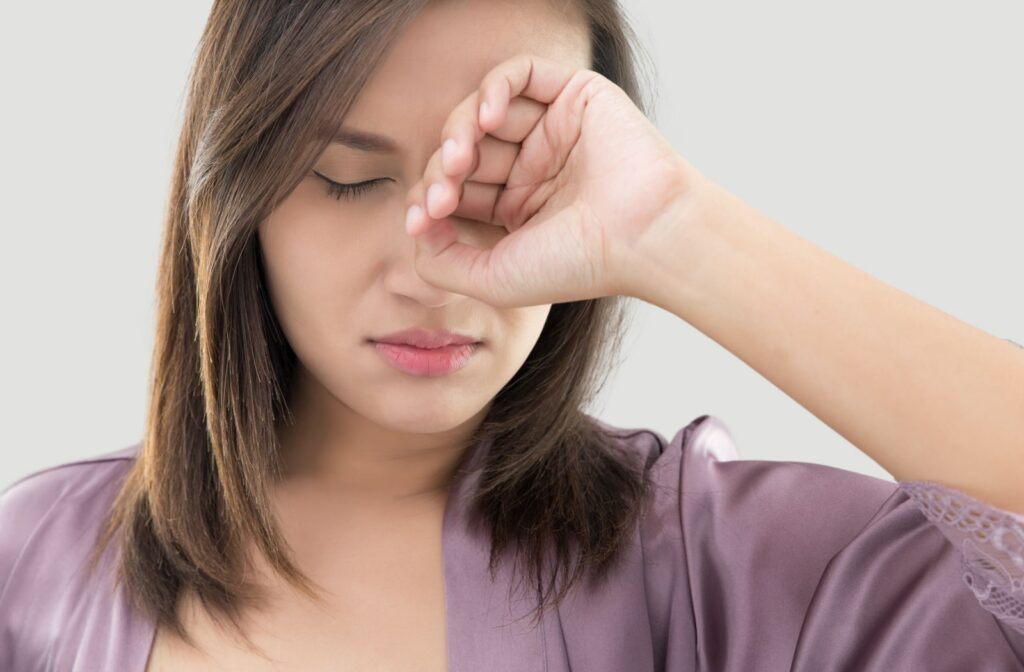
Waking up with dry eyes can be a real nuisance. It’s frustrating to start your day with a gritty or itchy feeling in your eyes. It is not only uncomfortable but also disrupts your sleep and makes it hard to get a restful night of sleep.
The good news is that dry eye is relatively easy to treat. Many effective remedies can be done at home without requiring a prescription to find relief. However, if you’re experiencing sudden or unusual symptoms, it’s a good idea to see an eye doctor to rule out any underlying conditions that may be causing your dry eye.
You can wake up feeling refreshed and comfortable by taking care of your dry eyes. Don’t let dry eyes hold you back from getting a good night’s sleep. Take control of your eye health and find relief from dry eye symptoms. Below are some of the main reasons why you keep waking up with dry eyes. Let’s check it out.
6 Reasons Why You Keep Waking Up With Dry Eye
1. Allergies
Allergies can cause dry eyes, whether they happen at certain times of the year or not. Taking the right allergy medicine can help reduce the chance of waking up with these symptoms. You can also keep your bedroom window closed and take a shower before bed to stop allergens from collecting in your bed. It’s also a good idea to wash your bedding regularly.
Common allergens can include:
- Mould
- Pet dander
- Dust mites
- Skincare products you may use before bed
2. Underlying Health Conditions
Certain medical conditions, such as blepharitis (inflammation of the eyelids) or meibomian gland dysfunction (MGD), can disrupt the production of the oily layer of tears that helps prevent evaporation. These conditions often worsen overnight, leading to dry, uncomfortable eyes upon waking. Incorporating treatments like LED eye patches can aid in managing dry eyes by promoting circulation and reducing inflammation around the eyes.
3. Environmental Factors
Living in a place with little moisture can make your eyes feel dry. Lots of people get dry eyes in the winter because the air is dry. But in some places, the air is dry all the time. Using a humidifier can help you feel better and stop your eyes from getting dry. If you use a humidifier in your bedroom, it can help you avoid waking up with dry eyes.
4. Inadequate Production of Tears
Dry eye syndrome happens when your eyes don’t make enough tears or the tears they make are not of good quality. If your tears dry up while you sleep, you may wake up with dry eyes. To fix this, your eye doctor needs to figure out why your tears aren’t doing their job.
One reason for not making enough tears is when the meibomian glands in your eyes aren’t working well. If this is the problem, your eye doctor can talk to you about different ways to treat it.
5. Nocturnal Lagophthalmos
Nocturnal lagophthalmos happens when the eyelids don’t fully close during sleep. It is often caused by weakness in the seventh cranial nerve, also known as the facial nerve. This weakness can be due to skull or jaw trauma, injury to the artery that supplies blood to the facial nerve, or Bell’s palsy, which causes temporary weakness in the facial muscles. This condition can also lead to poor sleep quality.
6. Tear Quality
Our eyes need to stay moist to stay healthy. Tears help with this by keeping the surface of the eye wet. They also help clean our eyes and fight off germs. The tear film contains three layers: water, oil, and mucus. Each layer does a different job of keeping our eyes healthy. When one of these layers isn’t working well, it can cause dry eyes. This is a common reason for dry eyes, and the symptoms can be worse in the morning.
Dry eyes can certainly contribute to the appearance of eye bags. Knowing how to get rid of eye bags in detail can further improve your overall eye health and appearance, making you feel more refreshed and confident every morning.
Conclusion
If you wake up with dry eyes, it’s a good idea to see an eye doctor to find out what’s causing the problem. They can check for any eye issues and suggest the best way to treat your dry eyes. In the meantime, you can also try using a warm cloth on your eyes and cleaning your eyelids to help. However, if your symptoms persist or don’t get better after a few days, it’s best to see an eye doctor. They can check your eyes thoroughly and suggest the right treatment for your specific problem.


